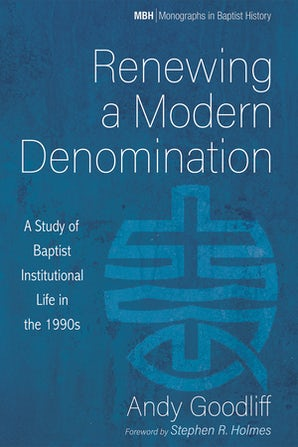'The Union has always been evolving'
Andy Goodliff shares a recent history of structural changes in the Baptist Union
 Reading the most recent Baptist Union Council report, it appears the Union is once again having to think about its structures due in part to financial restraints. We might be about to experience another set of changes to the Union in terms of how the national resource and associations are staffed, operate and relate.
Reading the most recent Baptist Union Council report, it appears the Union is once again having to think about its structures due in part to financial restraints. We might be about to experience another set of changes to the Union in terms of how the national resource and associations are staffed, operate and relate.
I say once again, because the Union has been in this position now a number of times, that is, the Union has always been evolving. This time, the results could be more far reaching, because they might impact congregations and ministers more directly.
Here's some recent history:
In 1970, the national resource — as it began to be termed in the 2000s — underwent change as it created three new main departments — ministry, mission and administration. Before then it was a series of smaller more ad hoc departments. Prior to 2002, the Union operated through Areas overseen by a General Superintendent. Each area included at least one or more County Associations. There were originally ten Areas and ten Superintendents; this was increased to 11 in 1981 and 12 in 1986.
In the 1990s there was a desire for change. Some of that was because of financial constraints (in 1992 the Union had to make several national staff redundant), but more generally it was from a desire for renewal. These changes were introduced in 2002 following a long consultation. The changes saw the end of Superintendents and County Associations, and the creation of 13 Regional Associations, each employing one or more Regional Minister.
What was not properly resolved — in fact arguably it has never been — was the relationship between the Union and the Associations. The County Associations, as they were, have a much longer history than the Union, some going back several centuries. The Union didn't emerge in importance until the early 20th Century.
Attempts were made in the 2000s to better clarify the relationship between Union and Association, especially around funding, but agreement was never reached.
In 2012 under new financial pressures, the Union (ten years on from the last restructuring) underwent a new process. The result this time was a reduction in size of the National Resource. This had grown in the early 2000s, partly under better economic conditions and partly from a sense of missional purpose created by the 2002 changes.
In addition to this reduction of staff, new attempts at cost saving in administration were initiated between Associations (what have been called Associational Partnerships).*
We are now just over ten years further down the line and once again the finances are forcing the Union to look at its structures. Alongside that are the questions of relationship between Associations and Union which I suggest have been bubbling away for decades, although since 2002, Associations carry a more equal weight to the national resource.
This time round the changes to the Union might be more dramatic — a movement of more responsibility from National Resource to the Associations (which would take the Union back to a similar place it was in the mid-1900s, when the Union as a national body was more token) or a movement of more responsibility back to the National Resource from the Associations.
The former might raise questions of ministerial accreditation and a sense of wider belonging. The latter might make our broader Baptist life feel more distant and removed (although some have felt that when the move was made from County to Regional Associations.)
Baptist structures beyond the local church have never been fixed. There has been lots of change through its 200 year old history, and issues of finance have often played a contributing role. Restructuring has also been undertaken to help increase a wider sense of belonging to the Union and/or to an Association. Identifying with Union or Association has never been something you can take for granted with Baptists, arising from an independent streak in Baptist churchmanship, and from theological tensions that appear between churches. It is probably a constellation of all these things — finance, independence, theology — which bring us to this moment.
In 2002, Darrell Jackson, in an article in the Baptist Ministers' Journal asked, 'Does the Future Have a Denomination?' He gave a qualified yes.
Asking the question today, if we choose to be honest, we might give the answer No.
Some might not be bothered by that, although I think if this did happen, it wouldn't take too long to feel the loss. Many of us would be and are bothered by that possibility, and this should drive us to prayer, soul-searching and seeking a renewed sense of our being Baptists, locally, regionally and nationally.
Andy Goodliff is the minister of Belle Vue Baptist Church, Southend.
 *For those interested in a more detailed history, see Andy's account in Renewing a Modern Denomination (Pickwick, 2021).
*For those interested in a more detailed history, see Andy's account in Renewing a Modern Denomination (Pickwick, 2021).
Do you have a view? Share your thoughts via our letters' page.
Baptist Times, 18/04/2023